Amazon has put together some great Home Gift Deals – save money and get your shopping done at the comfort of your home! Click here to see deals on Amazon
Let me guess…
You’re fed up with this uninvited spider living in your home. You have tried everything, but nothing seems to work.
So now you’re searching for “How to keep spiders away,” hoping that you will find a permanent solution and get rid of this little annoyance.
Well, here’s the deal.
You’ve come to the right place if you’re looking for effective strategies to eliminate spiders from home, office, garage, or storeroom.
In this post, I will provide you with multiple strategies (21 to be exact) to get rid of spiders from home. And best of all, these easy-to-implement simple strategies work. Some of it I’ve tried personally with excellent results.
Let’s jump in.
Why Do Spiders Get Inside the Home?
There are several reasons for the spider to get inside the home. The most common reasons are catching insects and flies that spiders feed on.
Another reason is to get warmth in the winter. The spider can’t tolerate freezing weather, and they need a place to hide and lay eggs. The home provides shelter and food, encouraging the spider to get inside the house.
You can buy indoor-outdoor thermometers to find out the temperature to know when spiders will indeed seek out your home. The thermometers will direct you to anticipate an increase in spiders’ activity.
What Do Spiders Eat and Why It Sometimes Bites?
Spiders are omnivorous rather than strictly carnivorous. The research study published in the journal indicated that spiders also encourage pollen and fungal spores, despite having sharp fangs that let them catch insects easily.
Now there are many different species of spiders that are purely carnivorous and will only eat insects, ants, flies, mosquitoes, moths, or any living thing they can catch in their web.
Some species of spiders even eat other spiders if they get a chance to keep the insect population in control.
Unlike mosquitoes and ticks that bite to feed on blood, spiders don’t bite humans for the blood. But, if a spider feels threatened or you hold on to its body barehanded, it will bite. The bite can usually bear mild pain and discomfort.
So, you don’t have to be scared of spiders. However, there are some poisonous spider species. You want to keep an eye on it and be careful when handling it.
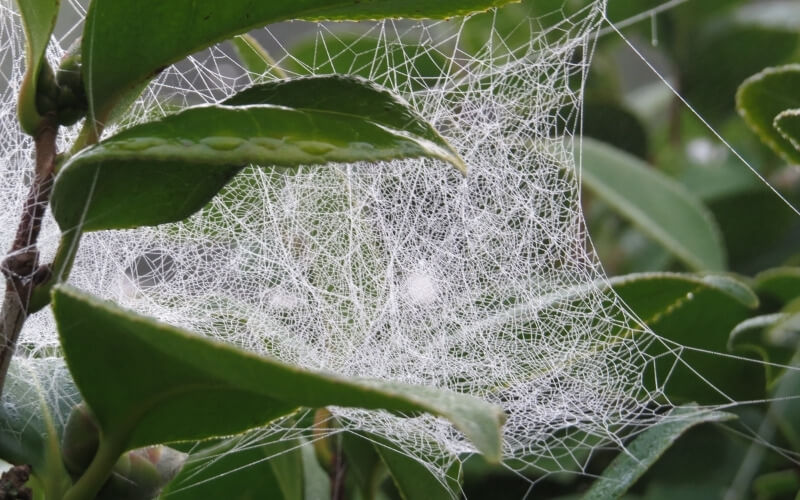
How to Get Rid of spider webs
The spider makes a web to catch its prey, and it’s not a very pleasing sight to have it inside the home.
Spider webs aren’t tough to remove, but it’s sticky and makes a mess if you mishandle them. The most common way to remove a spider web from a house is to vacuum it.
Using a handheld vacuum cleaner can suck up the spider web from the house. You will find spider webs mainly around the house corners.
Pay close attention to furniture or old artifacts which aren’t used regularly. If, after a vacuum, there is any leftover spider web, use a lint roller or dust brush to clean it up.
Note:
Look for the dark and obscure areas as those are the places where spiders make their web catch their prey.
Use a big stick, wrap some cloth around it, and brush up the spider web for any hard-to-reach places. You can also use a sock to tie it up at the end of the stick. Fix any broken window screen with holes that allow the spider to get inside the home and make a web.
How to Get Rid of Spider Eggs (Pictures)
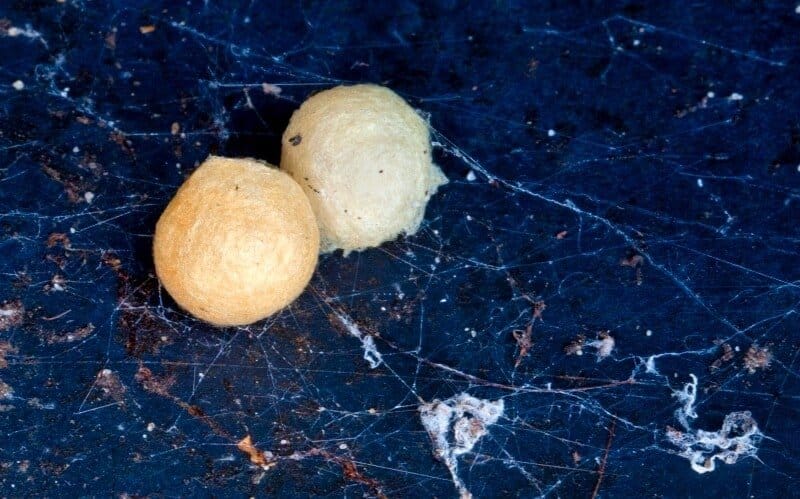
Spider eggs come in different shapes and sizes as the spider wraps the egg inside the web silk. These eggs often look like fluffy white round balls.
Each spider egg sac may contain thousands of eggs. Sometimes eggs are stuck to the wall or furniture and can’t be vacuumed out.
So, use a sharp object such as a screwdriver or pen to pry the egg sac away from the object. It’s also easier to clean and reduces the risk of eggs flying around the room.
Place a separate paper beneath the egg sac to make the cleanup process easier and less prone to the egg being blown away.
If you see a poisonous spider infestation with a severe danger level, wearing protective equipment such as gloves is crucial.
If you aren’t adequately trained, consider tracking down a professional exterminator for help in removing poisonous spider eggs.
Once you remove the spider egg from the house, dispose of it properly by sealing it in a bag. If you use a vacuum cleaner, empty it outside the home.
How to Keep Spiders Away from the House
There are several reasons you’ll not want spiders in your house. Although some spider species don’t cause problems for humans, some species are poisonous.
For the most part, it’s difficult to identify the spider species by the average person, but what choice do you have when it comes to one another? In the United States, black widow spiders get the most attention.
Generally speaking, garden spiders make their houses outside, but they move indoors and appear through the house in the winter.
As spiders survive inside the home through the fall and winter months, they move toward warmer rooms of the building to catch insects. The sight of these spiders swarming indoors usually happens in the autumn.
Here are some very effective ways to naturally keep spiders out of your house.
1. Peppermint Oil
Spiders don’t like peppermint oil and find it off-putting on their skin. Spiders have fine hairs on their leg that allow them to sense vibration and smell. The scent of peppermint oil overwhelms the spider.
Many insecticides include peppermint oil as one of the ingredients for spider repellent sprays. The peppermints and other essential oils contain a chemical called monoterpenoids, which are fumigants and have insecticidal properties.
So how to use peppermint oil to repel spiders? Check out this natural spider spray recipe.
Peppermint Based Natural Spider Repellent Recipe
- Take a 16-ounce spray bottle and put five drops of peppermint oil in it
- Fill the bottle with water
- Put 6 to 7 drops of dish soap
- Tight the spray bottle cap and apply where required
- Use once a week or every other few days
You can also plant a peppermint plant in a little pot and set the pot inside the corner where the spiders reside.
Prevent kids and pets from accidentally drinking peppermint essential oil as they might get lightheadedness, nausea, or dizziness. Apply as needed and keep the windows and door open after application.
You can buy the peppermint essential oil and spray bottle from here.
2. Vacuum the Spider Web
To get rid of spider eggs or spider webs efficiently, you should use a vacuum cleaner. You can extend the length of the hose, if necessary, to reach higher heights or underneath furnishings to get rid of spider webs. I found BugZooka Vacuum Catcher to be effective (Amazon link)
Wear rubber gloves when cleaning the vacuum box to prevent bug eggs from being thrown off. Empty the vacuum box into a garbage bag outside the house.
Be sure to vacuum behind the couch or cabinet since it’s often more difficult to clean in these areas.
3. Clean Your Home
Spiders often dislike being out in the open and hiding in corners or tight spaces. Regularly keeping your house clean and organized will reduce the chance of a spider’s invasion. Placing spider traps at often visited spider spots can reduce the dangerous spider population.
Regular cleaning also removes the dust, wood pile, and other small food source particles. These items attract small insects and cause the giant house spider or venomous spider to follow them.
Don’t leave trash around the house for an extended period and prevent it from piling up. If possible, put a dumpster outside the home. Also, trim the garden with electric string trimmers so that spiders will have less room for a hideout.
4. Vinegar
Vinegar has many uses, and its acetic acid-based composition is a highly effective spider repellent. Its effects work the same way as an essential oil but without any side effects.
Vinegar Insect Repellent Recipe:
- Mix one half-white vinegar with the water in a container
- Spray the mixture wherever you find insects.
- Be cautious when spraying around furniture, as it will have the potential to discolor it.
Spray it anyplace you see the bugs and spiders sneaking into the home. Vinegar is a fantastic alternative to essential oil because it doesn’t have a distinctive scent.
5. Hair Spray
If you see a spider web with a spider in it and don’t want to spray bug spray, you can use hair spray to catch the spider.
Hair spray is very thick, and a close burst of the hairspray can immobilize the spider. You may then either kill it or put it in a bag and dispose of it safely.
6. Plant Eucalyptus Trees
Have you seen those tall eucalyptus trees?
These are native to Australia and have stiff oily, and stinky leaves. The spiders don’t like the smell of eucalyptus. Planting it around the garden and house will keep spiders away during fall migration when they look for a warm place.
You may also use eucalyptus essential oils with an ultrasonic diffuser in your room to provide a pleasing scent while keeping spiders away.
7. Turn Off Outdoor Lights
Light attracts small insects and flies. You may have noticed the flies and insects crawling around the street light or even the outdoor lights of your house.
Spiders don’t care about the lights, but they care about the food. The spider gets naturally attracted to places where it can find an abundant natural diet, and the bright lights at night are one such place.
When not needed, turn off the outdoor light. This won’t attract the insects and flies anymore and keep the spider away. For indoor lights, use thick opaque shades and blinds. It will make the indoor light not to be visible from outside to insects.
If you must use a light, use a low power or yellow sodium vapor light, which is less attractive to insects and flies.
8. Horse Chestnuts

Horse chestnut conkers contain a natural oil that spiders don’t like. Place the chestnuts around the room or the areas where you have the spider problem.
Placing chestnuts near the entry places of your house, such as near windowsills or doors, will repel the spiders from getting inside the home.
Ensure you clean the home and remove any strong fragrance that may mask the chestnut odor first before placing it inside.
Don’t get confused between chestnuts and conkers. They both look the same but are very different. The chestnuts are edible and sweet. But horse chestnuts, also known as conkers, are toxic.
It contains a poisonous chemical called Aescin and shouldn’t be eaten. So be careful when using conkers around the house so pets or small children don’t accidentally swallow them.
9. Cedar
Cedar is a common tree trunk found in North America. It has a pleasantly fragrant wood. The tree’s fragrance will appeal to you, but spiders don’t like the taste of cedar.
This is good, as you can use cedar wood or non-wooden chips, which will be placed in a bag or hung in the closet. This will keep the spiders away from your wardrobe and clothing.
Cedar essential oil (Amazon link) is a good alternative if using cedar mulch isn’t practical for you.
10. Pet
Pets are fun to have around children and make an excellent company. Pets, especially cats, roam around the house and go through every nook and corner of the house. These are very curious and chase away anything which moves.
It may not be an efficient option if the home is infested with spiders. But pets will keep some spiders away.
11. Tobacco Leaves

Well, we aren’t speaking about cigarette tobacco. These tobaccos are chemically treated and highly dangerous.
We’re discussing tobacco leaves here. You can purchase tobacco leaves and place them where spiders commonly gather. In this manner, a strong odor will deter spiders from coming around these areas. If you want to grow, you can buy tobacco seeds online (Etsy link).
You can mix it with water to make a concentrated tobacco paste. You can then spray it as natural spider repellent using the concoction as a solution. You can also mix it with flour and use it as a natural spider repellent powder.
12. Baking Soda
You likely may have Baking Soda in your pantry, which you can use to keep rodents and insects out of your house. Baking Soda is generally effective for controlling the ants and insects in your home, but it’s also an effective spider repellent.
If you plan to relocate the spider and are worried about getting it out of your house, sprinkle baking soda in various places where they’re likely to hang around.
13. Turmeric
Turmeric is a common food ingredient and spice used in many cuisines, and it’s used medicinally as well. Turmeric is a natural spider repellent, and with it, you can easily keep your house spider free.
Sprinkle turmeric powder in easily spider-prone areas or purchase a small turmeric rod to scatter there.
Turmeric has an intense yellow color, so take care with it when you wish to use it for a home solution. Make a turmeric paste with water, and use it around the house for a better-performing solution.
14. Ladybugs
The ladybugs commonly seen on the lawn with bright black dots are fantastic spider controllers. Ladybugs don’t eat spiders, but it eliminates spider food insects. The significant difference is that ladybugs are more efficient insect killers than spiders.
Spiders may give up hunting for food when there are enough ladybugs in the area. Their numbers force the spider to move on to find somewhere else to food, which boosts your garden’s beauty.
While maintaining a pleasant environment for the ladybugs in the area, you will increase the beauty of your garden and repel spiders.
15. Wash Fruits and Cover food
Spiders are attracted to insects and flies as these are their preferred foods. Fruit, especially ripe and open fruit, attract flies and bugs.
Keeping your food covered and properly washed and stuck inside a sealed plastic bag will prevent your food from spoiling and take out bugs or flies that might get inside.
Since there won’t be as many flies or insects in the house, the spider will have no reason to be there.
16. Garlic
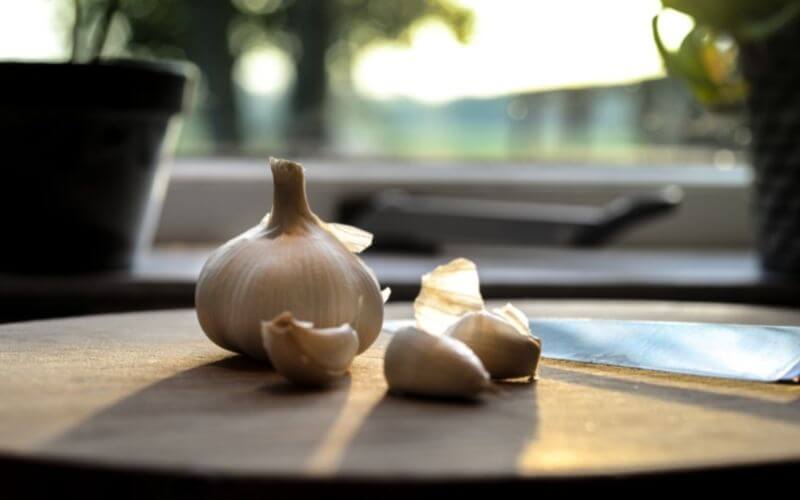
Garlic has an overpowering odor. It tastes good and is a common ingredient in dishes, but spiders dislike the strong smell of garlic.
This makes garlic a natural spider repellent without causing adverse side effects.
Garlic Based Natural Spider Repellent Recipe
- Mince or crush 4 or 5 garlic bulbs, and wrap them in a cloth
- Squeeze it harder to get garlic juice
- Drop the garlic juice in a spray bottle and spray it around the corners, floors, or areas where you have a spider problem
- Use once a week or every other few days.
17. Fill the Outside Crack
Spiders need a space to get in the house, and it doesn’t have to be a door. Spiders can get inside through tiny small cracks or gaps in the door. Cover the door gaps so there is no space when you close the door.
Walk around the house and locate the cracks or gaps. Use a caulking gun to seal the holes. The apparent crack locations are around most homes’ basement windows and corners.
18. Diatomaceous Earth Powder
Diatomaceous earth is also called DE, a white powdery substance made of fossils of a tiny sea creature named diatoms. DE is safe, and it eliminates spiders. Spread the diatomaceous earth powder around the home and the house regions the spiders frequent.
When spiders walk on this compound, it gets stuck to their body. The DE powder is incredibly reactive, and it cuts and adheres to the spider’s skin.
Meanwhile, the spider bleeds its bodily fluids that get absorbed into the DE powder. This results in the spider’s death in a few days.
19. Bleach
Bleach is an effective homemade pesticide that you can use to make homemade spider sprays.
Simply spray the bleach into places where you see spiders, and you should see the spider skulk away before long. Be careful when utilizing bleach near the textiles or upholstery; it can cause discoloration.
Cover the fabrics or carpet with a plastic material to prevent it from any damage.
20. Lavender

Lavender has many uses, and one of its advantages is its impressive capability to repel spiders and other insects. Moreover, natural repellent lavender has a hypnotic fragrance.
Therefore, it can be used inside and make it a safer place. Eucalyptus oil is yet another effective natural alternative.
Lavender Natural Spider Repellent Recipe
- Add a couple of drops of lavender essential oil into a 16 oz spray bottle.
- Add water and one tablespoon of liquid soap or dishwasher
- Shake it to mix it, then spray it around the problem area
- Use as needed till you get rid of the spider problem.
21. Citrus
When cut, citrus fruits such as oranges and lemons contain acetic acids that spiders hate. Squeeze them and collect the juice. Pour a little liquid into a spray bottle and add water to it. Spray this juice in areas where spiders have retreated to.
You can also peel your fruit and rub it in areas concerned about seeing a spider web. You can also leave sliced oranges and lemons in the problem areas and replace them in a day or two as they become dry.
You may need something far more powerful or complex if that is too much work or if you desire it. In that case, you can use the citrus essential oil that has a far more overpowering smell.
How To Keep Spiders Away From Your Bed
Spiders crawling on you while you’re sleeping is a spooky thought whether or not you’re scared of spiders.
Many people don’t like spiders like the yellow sac spider or the brown recluse spider walking on their bed. You can do numerous things to keep the spider out of your bed.
You should maintain your bedroom tidy. The clean place has fewer bugs for spiders to catch. The spider won’t camp in areas where there is no food. If you have a severe spider infestation problem, you can buy pest sprays or hire an expert exterminator service.
Peppermint oil spray and similar spider repellent methods eliminate the risk of spiders finding you during the night. These tips allow you to get started right away.
Here are some practical, easy steps to get some good results.
Raise Your Bed
Raising your bed by a couple of feet will allow small insects and flies to hunt beneath the bed rather than simply climb.
This will keep spiders to hunt from these insects under your bed. It won’t fix all your spider issues, but it reduces the likelihood of spiders walking on your bed.
You can also place small water-filled cups beside the foot of the bed. This will make it difficult for the insect to climb on the bed. Additionally, keep the bed away from the wall to make it more challenging for the spider to climb onto the bed.
Keep the Surrounding Area Clean
Cleanliness is essential. Cleaning the surrounding area keeps spiders from constructing a web or living in your bedroom.
Constantly vacuuming and dusting help keep the area clean and prevent spiders from settling there.
Don’t Eat on the bed
When you eat on the bed, there’s a risk of dropping the food particles on it and the floor. If you don’t clean it up immediately, food particles may attract insects, eventually attracting spiders.
Use Citrus Candles
Citrus candles are a great solution to repel spiders from your bedroom as they give off a strong scent that spiders dislike. Using citrus candles before going to bed will fill your room with the smell, which will deter the spider from coming near the bed.
And, you’ll experience the relaxing citrus aroma, which will help you linger more quickly into a deep slumber.
Door Sweep
Getting a proper door sweep effectively prevents insects and spiders from getting in the house. It also maintains the temperature inside the bedroom to help you lower the electricity bills.
For a door sweep, there are several products on the market. The adhesive silicone door sweep is most commonly available and helpful in keeping spiders and insects out of the house.
Clean Bed Sheets Frequently
Keeping the bed clean will prevent the dirt and grime from collecting on it, preventing bugs and spiders from climbing in. Clean bed sheets are a standard part of hygienic sleeping habits and are highly desirable for a decent sleep.
Let The Light and Air Come in
Spiders typically like dark places since they feel secure there. Opening your drapes and windows and allowing fresh air and light into the room eliminates all the moisture and humidity within this room.
Spiders and insects find this threatening, causing them to leave. Additionally, darkness helps you see any spider webs or insects that may enter your bedroom. Then, you can remove them without needing to venture into dark rooms and unknown places.
How to Keep Spiders Away from Patio Furniture
If you have outdoor patio furniture, you don’t want the spider to be roaming around it. To keep the spiders away from the patio furniture, start by regularly vacuuming or cleaning it.
If you don’t regularly clean it, insects and other flies start making it home, attracting the spider such as the wolf spider. When you don’t use patio furniture during the off-season, either bring it inside and store it safely or cover it with protective clothing.
The protective clothing prevents patio furniture from extreme weather and prevents spiders, making it home for itself.
You can spray the patio furniture with essential oil or other homemade spider repellent sprays to get rid of spiders.
How to Keep Spiders Away from Security Cameras
Security cameras are the right place for a spider to build its web. Most security cameras are placed at a hidden site or in higher hard-to-reach areas to get a proper viewing angle.
There are often outdoor lights nearby to get a clear image at night. These lights often attract insects and flies, which become a target for the spider.
The sharp corners of security cameras make a good base for the spider to weave its web to catch insects.
To keep spiders away from security cameras, keep the outdoor light bit away from the security camera, so insects or flies aren’t close by to the camera. You can also consider choosing a night vision security camera, so you don’t have to worry about installing an outdoor light.
Buy a security camera model which hasn’t have many sharp corners. It prevents the spider from attaching its web. Several models have a smooth and smaller footprint than security cameras, which may be ideal.
Don’t forget to clean the security camera when you vacuum or sweep the other house areas. Spraying a bug repellent around the camera will deter the spider from coming around it.
Over to You
Keeping your home free from spiders and other eight-legged creatures can take some planning and effort. It’s annoying to deal with spiders, but you will get rid of spiders in time if you follow the above strategies.
If you have any questions or suggestions, don’t forget to tell us in the comment below.
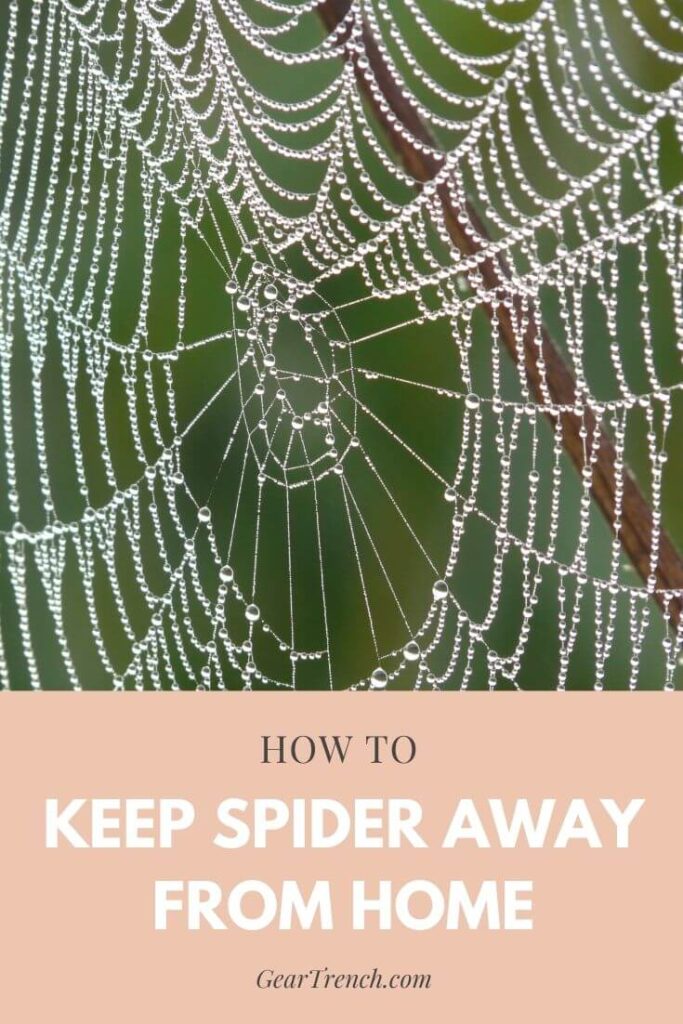
Don’t forget to share this post

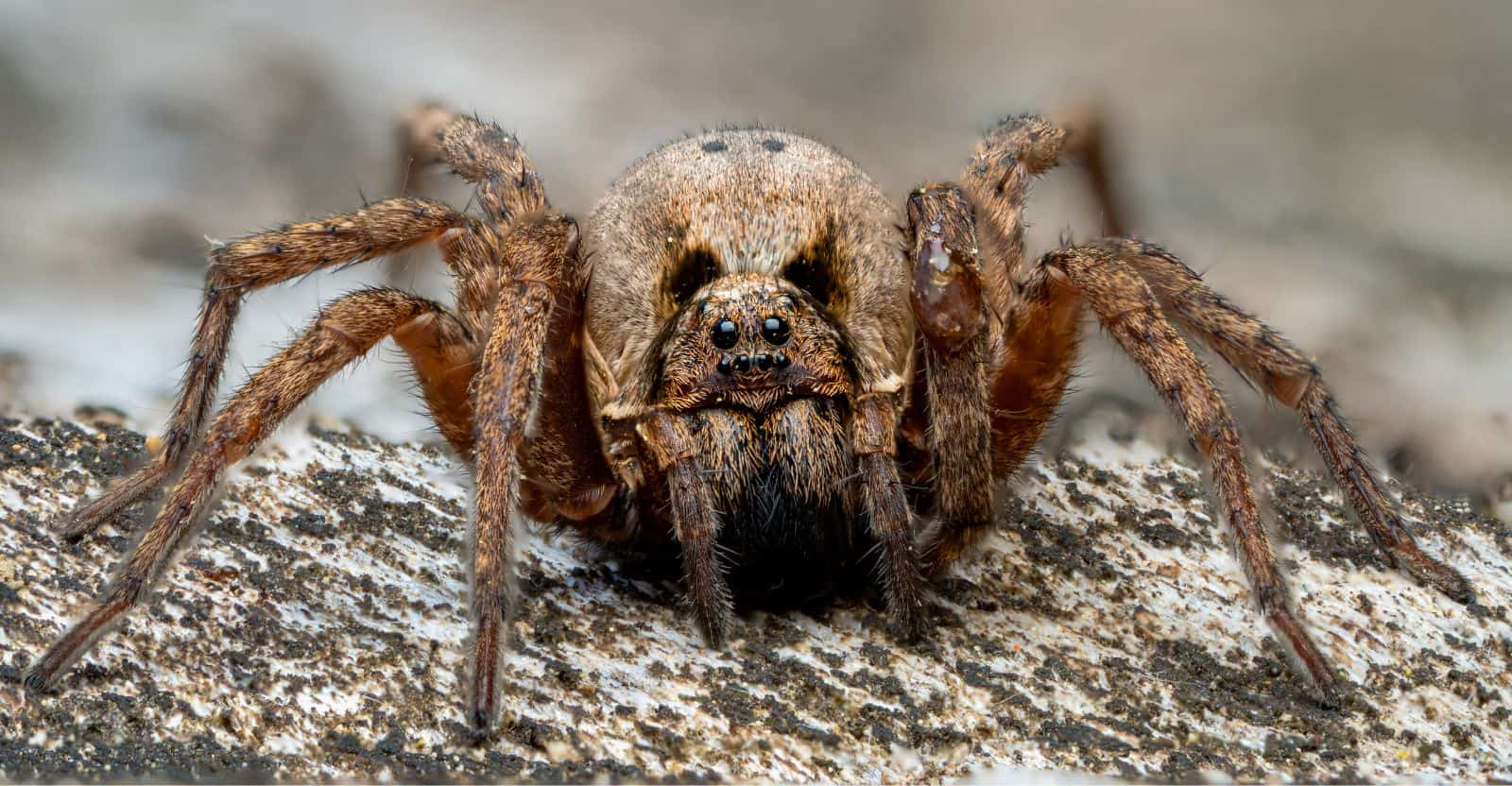


Thanks for sharing. I absolutely loved your ideas.